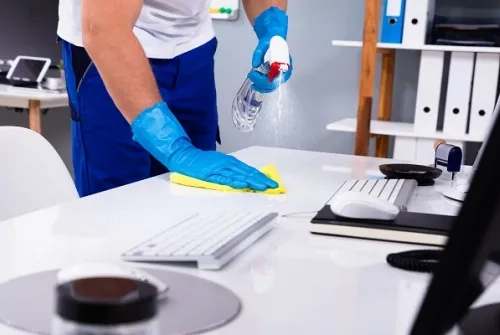Alo Yeditepe
Alo Yeditepe
Office Hygiene: The Most Common Areas Where Microbes are Found in the Office
If you are reading this at your workplace, you might start wondering how clean your keyboard, desk, and even your coffee mug really are. Research shows that common areas in the workplace such as refrigerators, microwaves, and kettles are hotbeds for microbes, some of which you wouldn't even think of. CHAMPS, a public health organization in the UK, tasked scientists at the Liverpool School of Tropical Medicine to analyze samples taken from communal kitchens in different workplaces. The research found that these shared kitchens harbored a multitude of potentially harmful bacteria and fungi, including fecal microbes that can spread when hands are not washed properly after using the toilet. Swab samples taken from a coffee machine, fridge door handles, and microwave buttons revealed the presence of E.coli bacteria, which can cause gastrointestinal illnesses, as well as Pseudomonas and Klebsiella, which can lead to respiratory infections and bloodstream infections, respectively.
So, how does regular exposure to these dirty areas affect our health? Dr. Özlem Alıcı, an infectious diseases specialist at Yeditepe University Hospitals, discusses the risks associated with communal areas.
“Clean-Looking Surfaces Still Harbor Many Microbes"
Noting that shared areas are an important breeding ground for bacteria and fungi, Assoc. Prof. Alıcı says "Various microorganisms such as bacteria and fungi are commonly found in the environment, we live in. Moist environments, surfaces and objects that are not cleaned and ventilated enough are particularly suitable places for their reproduction."
‘We Do not Get Sick as Often as We Come into Contact with Viruses’
Noting that we constantly come into contact with microorganisms and viruses through touch or respiration, but do not get sick as often as we come into contact, Assoc. Prof. Alıcı mentioned four important factors here.
Person's immune system: The immune system of healthy individuals eliminates most of the microorganisms that are transmitted from the environment without allowing the development of any disease.
Person's habits: Individuals who have the habit of washing their hands have a much lower risk of getting sick and transmitting infections.
Environment: Working in places where healthcare services are provided, such as hospitals, is riskier.
Type of microorganism: The type of microorganism that is transmitted, the environment it is present in, its ability to cause disease, and the quantity of microorganisms are also important factors.
"People Do Not Think They May Get Sick from Kitchen Countertops"
According to a recent study by Washroom Hygiene, a kitchen surface has 5 times more bacteria than a toilet seat, while a kettle has 12 times more bacteria than a toilet seat. Dr. Alıcı emphasizes that it is possible for shared office items to contain more bacteria than toilets, which are considered the dirtiest area. "Because toilets may be the most adhered to place for hand hygiene and are cleaned more frequently. Since everyone is aware that they need to be cleaned, more attention is paid to them. However, people are more likely to perceive a kitchen countertop or faucet as a clean place and do not think they will get sick from them. Even if hands are washed, they may not be as careful as they are after using the toilet. Therefore, there may be a higher bacterial load in these areas.
"Proper Hand Washing Can Significantly Reduce Bacterial Count"
According to recent research by Washroom Hygiene, a kitchen surface contains five times more bacteria than a toilet seat, while a kettle contains 12 times more bacteria. Dr. Alıcı points out that common items in the workplace may harbor more bacteria than toilets, which are typically cleaned more frequently and where hand hygiene is more strictly adhered to. People may be more likely to perceive a kitchen countertop or faucet as a clean area and not think they will contract illness from these surfaces, even if they wash their hands, as they may not be as diligent after using the restroom. Therefore, these areas may have a higher bacterial load. Dr. Alıcı also explains that proper hand washing, including using soap and water, spending sufficient time (at least 15 seconds), and rubbing the palms, fingers, and wrists, can significantly reduce the number of microorganisms on our skin. The aim is not to eliminate the beneficial bacteria that are already present on our skin, but to get rid of microorganisms that may be harmful and transmitted to other surfaces or people through contact with dirty hands.
About
Faculty and Year of Graduation:
Selçuk University, 1993
”
See Also
- Infections Common in Hot Weather
- What is Hepatitis B? What are its symptoms? How is it Transmitted?
- What is West Nile Virus? What are the Symptoms and how is it Transmitted?
- Viral Hepatitis and Prevention Methods
- Don't Be Late Fighting Against Diseases
- Information on H1N1 (Swine Flu)
- Do Not Put a Cigarette Butt or Pour Olive Oil or Liquid Soap on the Tick
- What is COVID-19?
- Ways to Prevent Coronavirus
- Swine Flu / H1N1
Alo Yeditepe




